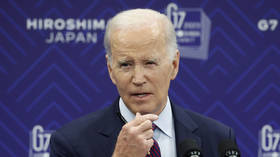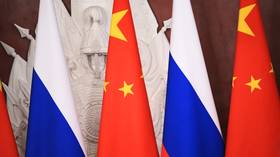Biden predicts China ‘thaw’

US President Joe Biden has told reporters that there will soon be a “thaw” in relations between Washignton and Beijing. With US sanctions still in place and the G7 leaders accusing China of posing a military and economic threat, Beijing questioned Biden’s “sincerity.”
Speaking at a press conference on Sunday after the G7 leaders’ summit in Hiroshima, Japan, Biden said that diplomatic communication between the US and China ceased after the shootdown of an alleged Chinese surveillance balloon in American airspace in February.
“Everything changed in terms of talking to one another,” the US president said. However, relations have seemingly improved, with Biden adding, “I think you’re going to see that begin to thaw very shortly.”
Biden followed his prediction of detente up with some mixed messages on Taiwan, however. After first stating that the US stands by the ‘One China’ policy – which recognizes, but does not endorse Beijing’s sovereignty over the island – Biden then vowed that the US would continue to sell weapons to Taipei and declared that “if China were to act unilaterally, there would be a response.”
Biden did not specify whether this response would involve the US military, but he has stated on multiple occasions that he would send US troops to repel a Chinese invasion of Taiwan. China bitterly condemned these statements, arguing that they “severely violate” the ‘One-China’ policy.
Responding to Biden’s comments, Chinese Foreign Ministry spokeswoman Mao Ning said on Monday that her country maintained the “necessary amounts of communication” with the US.
“Now the US says it wants to speak to the Chinese side while seeking to suppress China through all possible means and impose sanctions on Chinese officials, institutions and companies,” she continued. “Is there any sincerity in … communication like this?”
Asked whether he would consider lifting sanctions on Chinese officials, including Defense Minister Li Shangfu, Biden replied, “No, I’m not going to ease the sanctions.”
In a joint communique released on Saturday, Biden and his fellow G7 leaders denounced China over so-called “economic coercion,” the militarization of the South China Sea, and “interference” with foreign diplomats.
“If the G7 summit wants to discuss the issue of economic coercion, it might as well first discuss how the United States coerces the other six member states,” China’s foreign ministry countered. “Gone are the days when a handful of Western countries can just willfully meddle in other countries’ internal affairs and manipulate global affairs.”













